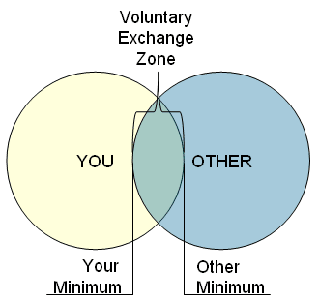The goal of negotiating is to take control of opportunities and tip them in your favor. We want to help you brush up on your negotiation strategies so you can get what you want.
In the US we’re all too spoiled with clearly defined prices. Prices are set and advertised which forces all the companies selling an identical or similar product, to compete on price forcing prices way down – Walmart style.
Companies compete and we the consumers win, right? Usually but not always and because we’re so use to having companies compete for our dollar we sometimes forget to notice when we’re getting a raw deal. That’s why we’re going to dust off the lost art of negotiation and make sure that you’re prepared to grab the savings you deserve.
I think it’s also important to note that you’re not always negotiating to spend less. Sometimes you’re negotiating for more, like for a raise, a promotion or even to land a job in during an interview. We’re going to go over when it’s appropriate to negotiate and how you should approach it.
[share]How To Apply The Lost Art Of Negotiation
The first thing you need to remember is that negotiation is not about you ripping off the person sitting across the table from you. Of course, you can try but chances are you’ll just piss him or her off getting you nowhere and maybe even torpedoing the negotiations before they really begin.
Your ultimate goal should be to reach a mutual agreement with the other person where you both leave the negotiating table feeling like you won. While there may be situations where you have the upper hand so to speak, you should rarely, if ever, let that be known to the other side. Leverage can work but it won’t always get you the best deal possible and it may mean that you will not be able to make future deals with this person.
Before you utter your first sentence you need to assess the situation and come up with your strategy. If negotiations don’t go as planned are you willing to walk away from the purchase or job? What is the motivation of the person you are negotiating with? Can they easily find another buyer? Do they need your money now? Can they find a replacement for you easily without much fallout?
Negotiating That Large Purchase

Large purchases are a bit different from buying a coffee. Often times prices are subject to speculation like in the housing market or a seller commission is at play like when you purchase a car.
In cases like this the price is really in the eye of the beholder and while you obviously see the price as low as possible, it’s likely that your negotiating counter part doesn’t agree.
Negotiating isn’t a form of strong arming since you can’t really bully your way into a better deal (unless you’re in the Mob or something). The Lost Art of Negotiation says that you need to come to a consensus with your negotiation partner (the seller) or, in other words, a mutually beneficial deal. Someone wont just sell you a house they lived in for 15 years because you’re clever, they need to feel like they are winning as much as you are.
In order to win, you need to really understand the other persons motivation. In the case of a house, if they are purely driven by the number than you need to help them understand (in a non confrontational way) why their house isn’t valued as high as they think it is. Luckily, it is rarely the case that they are solely motivated by the number (contrary to what you might think).
Maybe they are an older couple and just the fact that you are a very nice young couple with a beautiful daughter and son, they may be subconsciously willing to give a better deal. It’s scenarios like this that you need to look for and take advantage of. A skilled negotiator will focus on refining his empathy muscle because that’s what will win him deals, not being clever.
A skilled negotiator focuses on refining their empathy muscle because it will win them deals
Tweet ThisThis is our guide to budgeting simply and effectively. We walk you through exactly how to use Mint, what your budget should be, and how to monitor your spending automatically.
Negotiating Your Raise
It’s in your employer’s best interest to pay you the lowest amount possible while extracting the maximum value from your time. You on the other hand are trying to maximize the value of each hour you spend working and because there is no clear way to determine the value of your work, salary is a prime target for negotiation.
The first thing you must remember is to leave greed outside the negotiating room. In fact, if greed is the sole reason you have for a salary boost, you’re better off not negotiating and waiting. Like when you’re negotiating a house, you have one main opportunity to succeed and without the proper plan you are just setting yourself up to fail.
How much are your peers (be honest) making at other companies? How much are your peers making at your company? What degree of risk does the company (or division) face if you were to walk out the door? How easy would it be for the company to find your replacement? These are all questions you must answer before you even begin salary discussions. Be honest but don’t under estimate yourself. When you truely understand your weaknesses, confidence goes a long way!
When you’re prepared to negotiate you must have a salary range in mind and you must be willing to find another job if necessary. See, if they opt to not give you a raise, then there is a huge divide between your beliefs and theirs and if you stay, you are a pushover.
Before you begin negotiations, start tentatively looking for a job. If someone is willing to pay you more money after only knowing you for a few hours then you absolutely know that you’re under valued and your management probably does too.
Now that you have your negotiating ammo ready, applying The Lost Art of Negotiation is easy so don’t be nervous! Go speak to your boss, your bosses boss or whoever is truly capable of getting you a raise. Just tell them in the kindest way possible that your salary is way too low for the work you do.
The conversation might only be 5-10 minutes long. You’re not actually going to negotiate, you’re just planting the seed. Make sure you start this process well ahead of raise season and occasionally though out the year, keep reminding your management very politely, that you need a raise.
Viola! Come raise season, if you were honest with yourself and the questions we posed above then you should be sitting on a nice bump. If not, you’re working for a terrible company that will never pay you what you’re worth and at least you now know that you need to work elsewhere. See, being politely assertive can go a long way!
I also recommend you check out our podcast episode on getting an awesome job.
Don’t Waste Your Money
Whether you’re over paying or getting under paid, you’re losing money. Use empathy to understand the other side before you begin negotiating and remember, you really have nothing to lose.
If you’re negotiating for a house or car, there will be plenty more options if this deal falls though – being able to walk away from the negotiating table will be your single biggest bargaining chip. If you’re asking for a raise, unless you are really inappropriate in your approach you wont get fired for simply asking for more. It’s expected and many people have done it before you, trust me.
How do you think your bosses started making so much money? The generosity of your company? Hah, yea right!
Do you have an experience with negotiation? Have you been successful? Please share your experience in the comments!
And don’t forget to check out our daily uncensored personal finance podcast – we’re changing people’s financial lives one day at a time.



